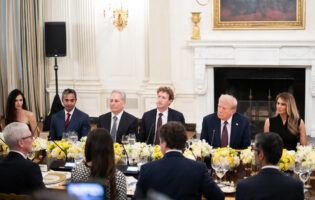
H. Raab via Flickr
Transitional Justice as a Foreign Policy Issue across the Atlantic: Trends and Counter-trends

Mariam Salehi
Center for Conflict Studies, University of Marburg
Dr. Mariam Salehi was a DAAD/AICGS Research Fellow from mid-April to mid-June 2019. She is a postdoctoral researcher at the Center for Conflict Studies, University of Marburg. While working toward her PhD, she was as a research fellow in the research network “Re-configurations. History, Remembrance and Transformation Processes in the Middle East and North Africa,” funded by the German Ministry of Education and Research. Prior to coming to Marburg, Mariam was a research associate at the chair for political science with a focus on international politics at Helmut Schmidt University, Hamburg. Her research interests are situated at the intersection of International Relations and Peace and Conflict Studies. They include transitional justice and processes of political and social change. She has written about her research for academic and non-academic publications, among the latter for openDemocracy, Internationale Politik, Frankfurter Rundschau, and The Washington Post’s The Monkey Cage blog.
During her fellowship at AICGS, Mariam will work on global transitional justice and Germany’s foreign policy on “dealing with the past.”
Transitional justice either describes a socio-political process in transitional societies after conflict or authoritarian rule or a set of measures that should facilitate this process. The process in general and the measures in particular should deal with injustices after violence or repression. It should bring about justice, contribute to lasting peace and democracy, and foster social cohesion and possibly reconciliation. Transitional justice measures commonly comprise trials, truth commissions, vetting/lustration of government and administration, reparation and compensation measures, as well as memorials and public apologies.
Transitional justice measures commonly comprise trials, truth commissions, vetting/lustration of government and administration, reparation and compensation measures, as well as memorials and public apologies.
The origins of the concept are usually traced back to the international criminal trials after World War II, although it was not called transitional justice at that point. In the late 1980s/early 1990s, then, the transitions in Latin America and Eastern Europe posed new challenges for human rights activists. A transitional justice “field” emerged through collaboration of activists, practitioners, and academics, and the corresponding term was coined. Transitional justice has gone through conceptual developments over time: from its roots in the legal area and focus on retributive justice (i.e., mainly trials) to the integration of broader needs in the transitional societies (e.g., truth-seeking, reparations, or memorialization). A global transitional justice paradigm has evolved over the last decades; a community of practice formed and the field became professionalized. Nowadays transitional justice is a standard practice for transitional societies; processes are most often carefully planned and accompanied by international professionals. Next to international organizations and NGOs that specialize in the matter, various states also support transitional justice initiatives through their foreign policy efforts.
Germany’s Foreign Policy on Dealing with the Past
Germany supports transitional justice processes in different parts of the world through the provision of financial means, through exchange and knowledge transfer, and also through technical expertise. Germany’s claims toward expertise in “dealing with the past” are often heavily based on and influenced by the country’s own experiences of dealing with the aftermath of war and dictatorship. Here, reference is commonly made to both how Germany remembers the Holocaust and how it has handled the legacy of the German Democratic Republic.
The aforementioned special experience and claim of expertise in “dealing with the past” are often related to policy debates about transitional justice.[1] In turn, expertise in the context of global transitional justice is asserted on the basis of Germany’s own experience. Germany is explicitly referring to its own experiences in its foreign policymaking and sees them as an asset and itself in a “special position to make valuable contributions.”[2]
However, how expedient is it to translate a state’s own experience into foreign policy efforts? Insights from previous research suggested that Germany’s foreign policy approach to transitional justice (or dealing with the past) seemed rather unstructured and that it did not really fit the global transitional justice paradigm. “In Germany, you don’t have transitional justice, you have dealing with the past,” I was told by a transitional justice professional,[3] indicating that the German efforts did not fit with what they understood to be contemporary transitional justice efforts. Germany was “doing its own thing,” concentrating on its own experiences rather than on what might be appropriate in a particular context. In the same vein, transitional justice advisors complained that “the Germans” would be raising unrealistic expectations by explaining what worked well in Germany, since the conditions and resources in Germany have been quite extraordinary, especially for dealing with the GDR past. I had several further conversations with transitional justice stakeholders with the same thrust: they assigned to Germany a “special” expertise that did not necessarily correspond to the contemporary challenges and the usual global transitional justice paradigm. This suggests that there may be a conceptual rift or disconnect that could necessitate bridging “global transitional justice” and Germany’s expertise in “dealing with the past.” These insights generated the question whether Germany, in its “export” of transitional justice policies, would be relying too directly on its own experience rather than on the former’s application and adaptation in different contexts.[4]
There may be a conceptual rift or disconnect that could necessitate bridging “global transitional justice” and Germany’s expertise in “dealing with the past.”
Currently, Germany is developing a new foreign policy strategy on dealing with the past. In an innovative process, the federal ministries involved sought input for this strategy development process from practitioners and academics through a blog debate.[5] Against the backdrop of the insights described above, I was interested in how Germany’s effort, presumably undertaken with the goal of further engaging in the field, was perceived by international transitional justice professionals. Since the United States is a hub for transitional justice practitioners and academics, the DAAD/AGI fellowship offered the opportunity to interview practitioners from governmental and non-governmental organizations, as well as researchers currently or previously involved in policy processes.
Talking to some contributors to the German blog debate in the U.S., this approach of seeking input from different perspectives provoked positive reactions from those who were involved. However, apart from the contributors most (if not all) of the transitional justice practitioners I talked to in the U.S. were not aware of Germany’s strategic development efforts.[6] In general, Germany was not seen to be an important player in the global transitional justice field. As one practitioner remarked, “Germany has never been part of those we have been coordinating with. If Germany wants to move into that direction, it would be good to know.”[7]
Here, the Swiss and the Dutch were mentioned as more important actors in transitional justice and therefore mentioned as countries with which the U.S. would coordinate its efforts. This cautiously confirms the initial impression that Germany has not been part of the community of practice that is shaping global transitional justice. If this is the goal, however, the new strategy would present a chance to change that. Yet, in order to do so, my American interlocutors emphasized that the approach would need to go beyond strategy for strategy’s sake and be accompanied by staff and financial resources: “Does [the new strategy] come with money and with people? Should I put Berlin on my agenda?”[8]
According to another interlocutor, money and people would be necessary, but not sufficient. It would be important to not only have bureaucrats and “career people” working on the issue, but also subject matter experts who bring in fresh ideas: “It has to come with money and people, but not only people, good people. New blood, new ideas.”[9]
In this vein, there was a strong sense among my interlocutors that having specialists rotating in and out of institutions is a good idea. Similarly, the U.S. foreign policy approach—to transitional justice in particular, but also to foreign policy in general—was described to me as one of the most elaborated (and thus superior to other approaches). With regard to transitional justice, the State Department has developed a longer-term financing mechanism that allows support for projects over a longer period of time, even intermittently if the political situation is volatile and requires temporal suspension. This insight accounts for the strong interest in whether the new German strategy would “come with money” and, if so, how the financing would be designed.
Moreover, the “community of practice” of transitional justice professionals managed to mainstream transitional justice expertise across state and non-state institutions. In this context, and fitting with the questions they had about whether Germany’s new strategy would “come with people” (and therefore would go along with an increase in specialized personnel) my interlocutors repeatedly emphasized the importance of people and personalities in doing so. Thus, people who have expertise in transitional justice and an interest in advocating for it can build networks to ensure that it remains on the agenda, is properly financed, and is handled by subject matter experts in the various institutions, so they would all be on the same page, which facilitates collaboration across institutions.
Trends and Counter-trends in the U.S.?
Nevertheless, recent developments could indicate that there is also a backlash in the U.S. against transitional justice and global accountability efforts. In the wake of the International Criminal Court’s considerations to open an investigation into Afghanistan, the Trump administration revoked the visa of the International Criminal Court’s chief prosecutor Fatou Bensouda, who was scheduled to speak before the United Nations, in order to prevent any possibilities of U.S. action being subject to investigation by the court. Additionally, observers and practitioners observed a general backlash with regard to respect for human rights: “A human rights-based approach is not self-evident in this administration,” [10] as one of my interlocutors put it.
Thus, I was interested in discussing whether transitional justice professionals could identify any trends or counter-trends in foreign policy potentially affecting their work. The picture I got here was ambiguous. On the one hand, transitional justice professionals stated that they are affected only to a very limited extent by mood swings or shifting priorities in the current administration. While there have certainly been some issues that would affect their work, such as funding priorities or general policy stances like the recent stop of all development aid to the Northern Triangle, the strong networks of “transitional justice people” across institutions would help in fending off potential challenges. Moreover, strong allies in Congress would help to secure the budget for the relevant structures and programs. And in general, there would be strong bipartisan support for seeking justice and accountability for war crimes and mass atrocities. This would be supported by both narratives of national interest and of responsibility. Problems would mainly occur with respect to issues that could work inward, such as a potential investigation of the ICC mentioned above, or discussions about reparations, since there are recurring public demands for reparations for slavery in the United States.
Others, however, were less optimistic and emphasized Trump administration initiatives to dismantle the State Department’s Office of Global Criminal Justice and the FBI’s International Human Rights Unit. While for the Office of Global Criminal Justice this is off the table (at least for now), I was told that it is still unclear what will happen to the Human Rights unit. Recently, two acts were signed into law that should further transitional justice, accountability, and atrocity prevention: the Elie Wiesel Genocide and Atrocities Prevention Act (signed into law in January 2019) and the Syrian War Crimes Accountability Act (signed into law in August 2018 as section 1232 of the John S. McCain National Defense Authorization Act). Zachary D. Kaufman, a transitional justice specialist who co-authored both acts, emphasized that it took extensive negotiations to secure that they would be signed into law and that the Office of Global Criminal Justice would be explicitly included in the Syrian War Crimes Accountability Act.[11]
It seems to be a matter of perspective whether one emphasizes the challenges to the institutions that work on human rights and global accountability or rather the resilience of the relevant processes, structures, and networks.
Thus, it seems to be a matter of perspective whether one emphasizes the challenges to the institutions that work on human rights and global accountability or rather the resilience of the relevant processes, structures, and networks.
Conclusion
In the U.S., transitional justice and global accountability are issues that remain on the agenda, although there have been some challenges to the existing structures. These structures in combination with well-established networks across institutions, however, proved resilient to some degree. My interlocutors also emphasized that they assume this work will not be particularly controversial among policymakers and the wider public—unless it potentially touches upon domestic issues, such as reparations or the possibility of American citizens standing trial before the ICC.
Germany’s foreign policy efforts on dealing with the past have so far quite often been inward looking, building on narratives of responsibility and the country’s own experience of working through the Nazi and GDR past. This sometimes provoked the impression that it was lacking context-sensitivity, since the German experiences were quite particular and therefore not necessarily a suitable example for other contexts. While German engagement with reference to the own experience was generally welcomed, the claim for expertise on the same basis was seen as more problematic.
In general, Germany was not so much on the radar as a potential partner for transitional justice initiatives for many of my interlocutors in the U.S. While the new German foreign policy strategy on transitional justice is not out yet, it would need to further connect with the global scene if there is an interest in doing more on the issue and fitting into the existing structures. To make an impact with its new foreign policy strategy on transitional justice and to create a similarly strong network of subject matter experts across the institutions, Germany would be expected to buttress its new strategy with financial resources and personnel. Only then could it become an interesting partner for those who have been more active in the field internationally but have not yet worked substantially with German actors.
Supported by the DAAD with funds from the Federal Foreign Office (FF).
[1] See e.g., Bundesministerium für wirtschaftliche Zusammenarbeit und Entwicklung et al., Aufarbeiten, anerkennen, ahnden: Eine neue Strategie der Vergangenheitsarbeit für nachhaltigen Frieden (2018), available at https://peacelab.blog/2018/09/aufarbeiten-anerkennen-ahnden.
[2] Federal Government of Germany, Guidelines on Preventing Crises, Resolving Conflicts, Building Peace (2017), p.95, available at https://www.auswaertiges-amt.de/blob/1214246/057f794cd3593763ea556897972574fd/preventing-crises-data.pdf.
[3] Personal conversation with a U.S.-based international transitional justice professional, Tunis, March 2015.
[4] These insights are based on formalized interviews as well as on more informal conversations.
[5] Contributions are available at https://peacelab.blog/debatte/vergangenheitsarbeit
[6] Several interviews and conversations in Washington, DC, New York, and the San Francisco Bay Area, April-June 2019.
[7] Interview, Washington, DC, May 2019. This and subsequent quotes as well as the arguments presented in the following resulted from interviews during my DAAD/AGI Research Fellowship between April and June 2019.
[8] Ibid.
[9] Interview, Stanford, May 2019.
[10] Interview, Washington, DC, May 2019.
[11] Phone interview, June 2019.








